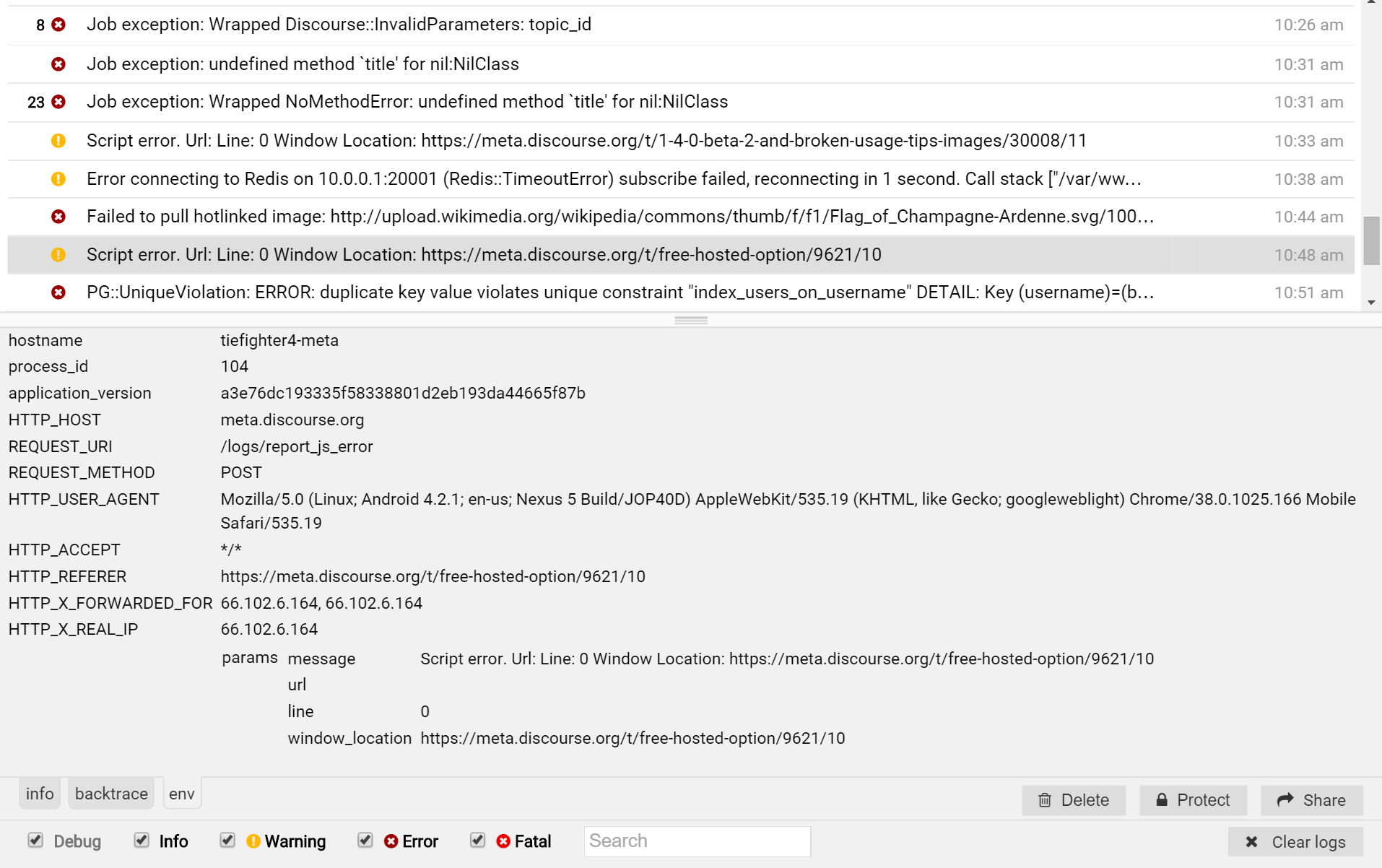Logster is an embedded Ruby "exception reporting service" admins can view on live websites, at http://example.com/logs
Interface
Play with a live demo at logster.info/logs.
Installation
Add these lines to your application's Gemfile:
gem 'redis'
gem 'logster'
And then execute:
$ bundle
To make logster web available add the following to your routes.rb:
constraints lambda { |req| req.session["admin"] } do
mount Logster::Web => "/logs"
end
By default, logster will only run in development and production environments.
To run logster in other environments, in config/application.rb
Logster.set_environments([:development, :staging, :production])
Configuration
Logster can be configured using Logster.config:
-
Logster.config.application_version: set to a unique identifier denoting version of your app. The "solve" function takes this version into account when suppressing errors. -
Logster.config.enable_js_error_reporting: enable js error reporting from clients -
Logster.config.rate_limit_error_reporting: controls automatic 1 minute rate limiting for JS error reporting. -
Logster.config.web_title:<title>tag for logster error page. -
Logster.config.enable_custom_patterns_via_ui: enable the settings page (/settings) where you can add suppression and grouping patterns. -
Logster.config.allow_grouping: Enable grouping of similar messages into one messages with an array ofenvof the grouped messages. Similar messages are messages that have identical backtraces, severity and log message. -
Logster.config.maximum_message_length: set a maximum length for log messages that are shown inside theinfotab and in the message rows in the UI. Messages that exceed the specified length will be truncated and an ellipsis will be appended to indicate that the message has been truncated. Default value is 2000. -
Logster.config.maximum_message_size_bytes: set a maximum size for message objects. Default value is 10,000. If a message size exceeds this limit, Logster will first remove all occurrences ofgems_dir(more on this config below) from the backtrace and computes the size again; if the message is still above the limit, Logster will remove as many as character as needed from the backtrace to bring the size below the limit. It's discouraged to set this config to a really low value (e.g. less than 2000) because a message needs a minimum amount of data in order to make sense (the minimum amount varies per message), so the closer the limit is to the minimum amount of space needed, the more of the backtrace will be removed. Keep this in mind when tweaking this config. -
Logster.config.max_env_bytes: set a maximum size forenv. Default value is 1000. In caseenvis an array of hashes, this limit applies to the individual hashes in the array rather than the whole array. If anenvhash exceeds this limit, Logster will take the biggest subset of key-value pairs whose size is below the limit. If the hash has a key with the nametime, it will always be included. -
Logster.config.max_env_count_per_message: default value is 50. Logster can merge messages that have the same backtrace, severity and log message into one grouping message that have manyenvhashes. This config specifies the maximum number ofenvhashes a grouping message is allowed to keep. If this limit is reached and a new similar message is created and it needs to be merged, Logster will remove the oldestenvhash from the grouping message and adds the new one. -
Logster.config.project_directories: This should be an array of hashes that map paths on the local filesystem to GitHub repository URLs. If this feature is enabled, Logster will parse backtraces and try to construct a GitHub URL to the exact file and line number for each line in the backtrace. For a Rails app, the config may look like this:Logster.config.project_directories = [{ path: Rails.root.to_s, url: "https://github.com/<your_org>/<your_repo>" }]. The GitHub links that are constructed will use themasterbranch. If you want Logster to use theapplication_versionattribute from theenvtab so that the GitHub links point to the exact version of the app when the log message is created, addmain_app: truekey to the hash. -
Logster.config.enable_backtrace_links: Enable/disable the backtrace links feature. -
Logster.config.gems_dir: The value of this config isGem.dir + "/gems/"by default. You probably don't need to change this config, but it's available in case your app gems are installed in a different directory. An example where this config is needed is Logster demo site: https://github.com/discourse/logster/blob/master/website/sample.rb#L77. -
Logster.config.back_to_site_link_path: Path for the backlink to site. -
Logster.config.back_to_site_link_text: Text for the backlink to site.
Tracking Error Rate
Logster allows you to register a callback when the rate of errors has exceeded a given limit.
Tracking buckets available are one minute and an hour.
Example:
Logster.register_rate_limit_per_minute(Logger::WARN, 60) do |rate|
puts "O no! The error rate is now #{rate} errors/min"
end
Logster.register_rate_limit_per_hour([Logger::WARN, Logger::ERROR, Logger::FATAL], 60) do |rate|
puts "O no! The error rate is now #{rate} errors/hour"
end
Note
If you are seeing the error No such middleware to insert before: ActionDispatch::DebugExceptions after installing logster,
then you are using a conflicting gem like better_errors or web-console.
To avoid this error, make sure logster is added behind those conflicting gems in your Gemfile.
If you're using Logster with a non-rails app, you'll need to be careful that the env hashes of messages that Logster receives don't contain strings with invalid encoding because at some point Logster calls #to_json on the message env and the method will fail with JSON::GeneratorError.
The reason this doesn't happen in rails apps is because ActiveSupport has a monkey patch for #to_json.
Mount using warden (devise)
admin_constraint = lambda do |request|
request.env['warden'].authenticate? and request.env['warden'].user.admin?
end
constraints admin_constraint do
mount Logster::Web, at: "/logs"
end
Mount using devise (method 2)
Change :admin_user symbol with your devise user, example :user. In -> lambda block change admin? method with your authorization method Or simply define a admin? method in you user model.
authenticate :admin_user, ->(u) { u.admin? } do
mount Logster::Web, at: "/logs"
end
Out of the box, logster will use the default redis connection, to customise, in config/application.rb
Logster.store = Logster::RedisStore.new(redis_connection)
Heroku Deployment
In case you may be using the rails_12factor gem in a production deployment on Heroku, the standard Rails.logger will not cooperate properly with Logster. Extend Rails.logger in your config/application.rb or config/initializers/logster.rb with:
if Rails.env.production?
Rails.logger.extend(ActiveSupport::Logger.broadcast(Logster.logger))
end
Thanks
Logster UI is built using Ember.js
Contributing
- Fork it ( https://github.com/discourse/logster/fork )
- Create your feature branch (
git checkout -b my-new-feature) - Run
cd client-app && yarn install - Run
cd website && bundle install - In the root directory, run
bundle exec rake client_devto start Sinatra server (port 9292) and Ember server (port 4200). Use Ember server for hot reload for client code. - Visit
http://localhost:4200/logs/(with trailing slash) to test the application. Reloadhttp://localhost:4200/report_errorto add sample log data. - Once you're done making changes, run
./build_client_app.shto make and copy a production build to the assets folder. - Commit your changes (
git commit -am 'Add some feature') - Push to the branch (
git push origin my-new-feature) - Create a new Pull Request

